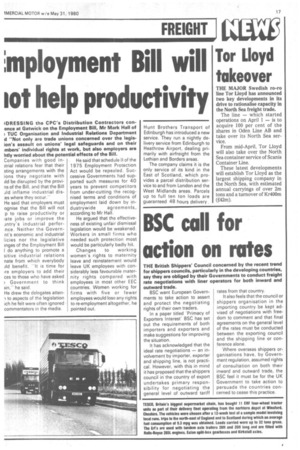Itiployment Bill will tot help productivit
Page 19

If you've noticed an error in this article please click here to report it so we can fix it.
1DRESSING the CPC's Distribution Contractors cononce at Gatwick on the Employment Bill, Mr Mark Hall of t TUC Organisation and Industrial Relations Department d "Not only are trade unions concerned over the legision's assault on unions' legal safeguards and on their inbers individual rights at work, but also employers are htly worried about the potential effects of the Bill.
Companies with good in;trial relations fear that their sting arrangements with the ions they negotiate with old be disrupted by the provins of the Bill, and that the Bill J Id inflame industrial dis:es where they occur."
He said that employers must ognise that the Bill will not p to raise productivity or !ate jobs or improve the intry's industrial perfornce. Neither the Governnt's economic and industrial licies nor the legislative inges of the Employment Bill I do anything to promote a sitive industrial relations nate from which everybody
J Id benefit. It is time for Ire employers to add their ces to those who have asked
Government to think tin," he said.
He drew the delegates atten-1 to aspects of the legislation ich he felt were often ignored commentators in the media.
He said that schedule II of the 1975 Employment Protection Act would be repealed. Successive Governments had supported such measures for 40 years to prevent competitors from under-cutting the recognised terms and conditions of employment laid down by in dustrywide agreements,. according to Mr Hall.
He argued that the effectiveness of existing unfair dismissal legislation would be weakened. Workers in small firms who needed such protection most would be particularly badly hit.
Changes to working women's rights to maternity leave and reinstatement would leave UK employees with considerably less favourable maternity rights compared with employees in most other EEC countries. Women working for firms with five or fewer employees would lose any rights to re-employment altogether, he pointed out.




























































































































